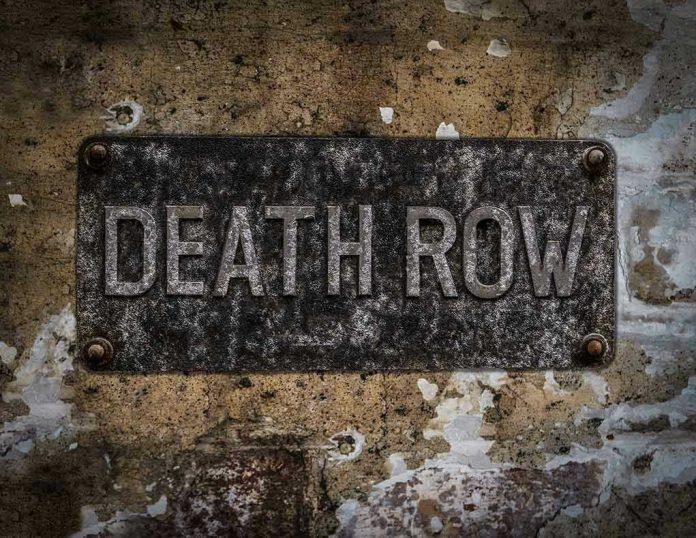
What does it mean when justice takes nearly four decades, the state sets a record for executions, and a single case stirs the conscience of an entire community?
Story Snapshot
- Florida executed Richard Barry Randolph for the 1988 rape and murder of his former manager, Minnie Ruth McCollum, after more than 35 years on death row.
- The brutality of the crime and the long legal process underline Florida’s aggressive death penalty policy under Governor Ron DeSantis.
- Randolph’s execution marked the 17th in Florida in 2025, the highest number in a single year since the death penalty was reinstated.
- This case reignites debates about closure, deterrence, and the morality of capital punishment amid shifting political winds.
Florida’s Record-Breaking Year for Executions: A Singular Case in Focus
November 20, 2025, drew a hard line in Florida’s history books. Richard Barry Randolph, convicted in 1989 for the savage murder and rape of his former convenience store manager, met his end by lethal injection at Florida State Prison. This was not a routine event. Randolph’s execution was the 17th of the year, a number unmatched since the Supreme Court reinstated the death penalty in 1976. The detail that refuses to fade: Randolph spent over 35 years fighting his sentence, while the victim’s family waited for closure, and the state ratcheted up its resolve to push executions forward.
The case began in the sticky heat of August 1988. Randolph, a former employee with a history of grievances, confronted Minnie Ruth McCollum as she tried to stop him from breaking into the store safe. Violence escalated quickly. Witnesses later described Randolph fleeing the scene; McCollum was discovered alive but comatose, succumbing to her injuries six days later. The brutality—beating, strangulation, stabbing, and sexual assault—haunted the local community and investigators alike, propelling prosecutors to pursue the ultimate sentence. Few crimes so thoroughly erase the line between private vendetta and public outrage.
Legal Delays, Political Will, and a Governor’s Agenda
Legal battles stretched across decades. Randolph’s appeals cited procedural missteps and sought mercy from every possible court, including the U.S. Supreme Court, which denied his final plea on the very morning of his execution. The delay was not unusual for capital cases in America, but the timing was telling. Governor Ron DeSantis had begun to accelerate the pace of executions, signing more death warrants than any Florida governor in nearly fifty years. State officials claimed this was about justice for victims’ families and the deterrence of future crime, but the optics—record-breaking executions in a single year—suggested a shift as much political as judicial.
McCollum’s family, present at the execution, expressed gratitude to the governor and relief that justice, however delayed, was at last delivered. The Department of Corrections relayed their thanks publicly, cementing the narrative that the state had finally made good on its promise. Yet, for many, the spectacle of a state speeding up death sentences raises questions about what justice truly looks like, and whether swiftness can ever make up for the years lost in waiting.
Florida man executed for killing his former manager at a convenience store
— WSFA 12 News (@wsfa12news) November 21, 2025
The Moral and Social Costs of Capital Punishment’s Resurgence
Florida’s current approach to capital punishment is not without controversy. Supporters argue that executions like Randolph’s bring long-awaited closure and serve as a deterrent. Opponents, however, remain unconvinced by claims of efficacy. Legal experts and ethicists point to the lack of conclusive evidence that executions reduce violent crime rates. They also highlight the risk of wrongful convictions, the emotional toll on all involved, and the way prolonged legal proceedings can perpetuate suffering on both sides of the courtroom.
This year’s unprecedented pace of executions has put Florida at the center of a national debate about the proper role of the state in administering ultimate punishment. Some see in Governor DeSantis’s record a return to law-and-order politics, a demonstration of resolve in turbulent times. Others see a system whose flaws—racial disparities, lengthy appeals, and high costs—demand a more cautious and reflective approach. Either way, the Randolph case is now a touchstone, a story that will be cited by both sides as the country continues to wrestle with the most permanent of punishments.
Closure, Precedent, and the Future of Justice in Florida
The long-delayed execution of Richard Barry Randolph has set new precedents for Florida. Not only has it raised the bar for the number of executions in a single year, it has also redefined the pace at which justice is enacted in the state. For the McCollum family, the moment brought a measure of peace. For the community, the event triggered renewed reflection on the balance between justice and mercy, and on the meaning of closure after so many years.
The ripple effects of this case may extend far beyond the prison walls. Political leaders in other states are watching closely, weighing the risks and rewards of following Florida’s lead. Advocacy groups on both sides have seized on the story to argue for their visions of justice. For now, the execution of Richard Barry Randolph stands as a stark reminder that the machinery of justice, once set in motion, can grind on for decades—changing lives, setting records, and forcing a community to ask, again and again, what price is paid for closure.













